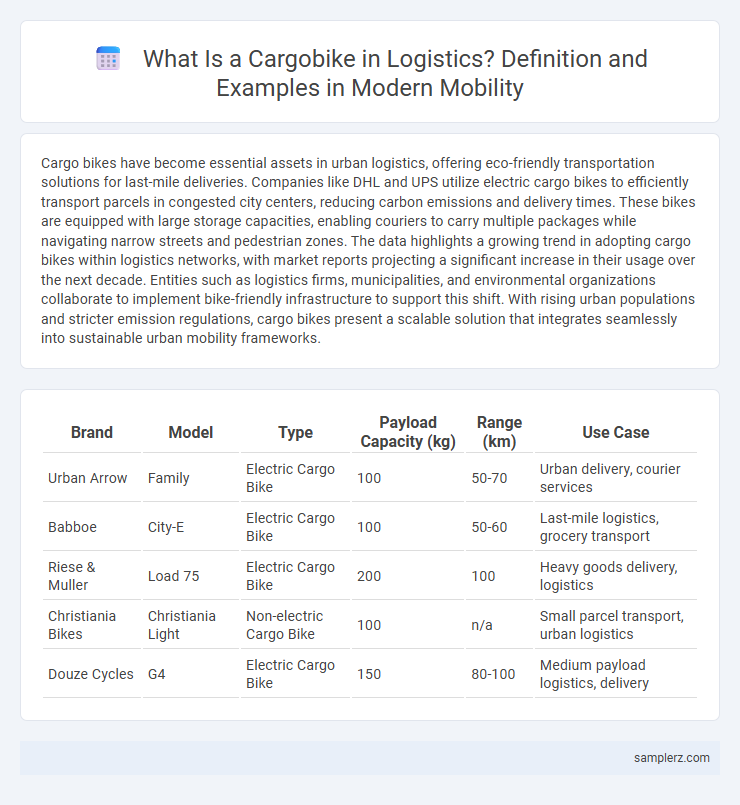Cargo bikes have become essential assets in urban logistics, offering eco-friendly transportation solutions for last-mile deliveries. Companies like DHL and UPS utilize electric cargo bikes to efficiently transport parcels in congested city centers, reducing carbon emissions and delivery times. These bikes are equipped with large storage capacities, enabling couriers to carry multiple packages while navigating narrow streets and pedestrian zones. The data highlights a growing trend in adopting cargo bikes within logistics networks, with market reports projecting a significant increase in their usage over the next decade. Entities such as logistics firms, municipalities, and environmental organizations collaborate to implement bike-friendly infrastructure to support this shift. With rising urban populations and stricter emission regulations, cargo bikes present a scalable solution that integrates seamlessly into sustainable urban mobility frameworks.
Table of Comparison
| Brand | Model | Type | Payload Capacity (kg) | Range (km) | Use Case |
|---|---|---|---|---|---|
| Urban Arrow | Family | Electric Cargo Bike | 100 | 50-70 | Urban delivery, courier services |
| Babboe | City-E | Electric Cargo Bike | 100 | 50-60 | Last-mile logistics, grocery transport |
| Riese & Muller | Load 75 | Electric Cargo Bike | 200 | 100 | Heavy goods delivery, logistics |
| Christiania Bikes | Christiania Light | Non-electric Cargo Bike | 100 | n/a | Small parcel transport, urban logistics |
| Douze Cycles | G4 | Electric Cargo Bike | 150 | 80-100 | Medium payload logistics, delivery |
Urban Delivery Solutions: Integrating Cargo Bikes into City Logistics
Cargo bikes enhance urban delivery solutions by providing eco-friendly, efficient transportation for last-mile logistics in congested city centers. Their compact design enables easy navigation through narrow streets and reduces carbon emissions compared to traditional delivery vans. Integrating cargo bikes into city logistics supports sustainable urban mobility and improves delivery speed and cost-effectiveness.
Reducing Last-Mile Emissions with Electric Cargo Bikes
Electric cargo bikes are transforming last-mile logistics by significantly reducing carbon emissions compared to traditional delivery vans. These bikes offer zero tailpipe emissions and lower energy consumption, making them ideal for urban areas with strict pollution regulations. Companies adopting electric cargo bikes report enhanced delivery efficiency and improved environmental sustainability in congested city centers.
Case Studies: Successful Cargo Bike Implementation in Logistics
DHL's deployment of cargo bikes in urban logistics significantly reduced carbon emissions and improved last-mile delivery efficiency by cutting delivery times in congested city centers. UPS integrated electric cargo bikes in Amsterdam to navigate narrow streets, resulting in a 20% decrease in fuel consumption and enhanced route flexibility. Swiss Post's use of cargo bikes for parcel deliveries demonstrated increased customer satisfaction through faster, quieter, and more sustainable service, setting a benchmark for eco-friendly logistics solutions.
Types of Cargo Bikes Used in Freight Transport
Cargo bikes in logistics primarily include longtail bikes, box bikes, and trikes, each designed to optimize freight transport in urban environments. Longtail bikes extend the rear frame to carry larger loads, while box bikes feature a spacious front or rear cargo container for bulkier items, and trikes offer enhanced stability with three wheels for heavier or uneven cargo. These types improve efficiency, reduce emissions, and provide flexible solutions for last-mile delivery challenges in congested city areas.
Cost Efficiency and ROI of Cargo Bike Logistics
Cargo bike logistics significantly reduce last-mile delivery costs by minimizing fuel consumption and lowering maintenance expenses compared to traditional vans. Businesses report a faster return on investment due to increased delivery frequency and reduced parking fees in urban areas. This cost efficiency supports scalable, sustainable urban logistics with high ROI for companies adopting cargo bike fleets.
Cargo Bikes for E-Commerce and Parcel Delivery
Cargo bikes significantly enhance e-commerce and parcel delivery efficiency by enabling faster last-mile logistics in congested urban areas. These eco-friendly vehicles reduce carbon emissions while navigating narrow streets and limited parking zones, optimizing delivery routes and cutting operational costs. Companies leveraging cargo bikes report higher customer satisfaction due to timely deliveries and increased sustainable transport solutions.
Overcoming Challenges in Cargo Bike Logistics Adoption
Cargo bike logistics face challenges such as limited load capacity, urban infrastructure constraints, and weather dependencies, requiring innovative design and route optimization to increase efficiency. Integrating electric-assist motors enhances range and rider endurance, overcoming physical limitations and enabling heavier payloads. Collaborative urban planning and dedicated bike lanes facilitate smoother cargo bike operations, reducing delivery times and promoting sustainable last-mile logistics.
Collaborative Logistics: Cargo Bike Hubs and Micro-Depots
Cargo bike hubs and micro-depots enhance urban logistics by allowing multiple delivery companies to consolidate shipments, reducing traffic congestion and emissions. These collaborative logistics centers enable efficient last-mile delivery in dense city areas, leveraging electric cargo bikes for swift, eco-friendly transport. Data shows that cities using micro-depots experience up to a 30% decrease in delivery times and a significant reduction in carbon footprint.
Safety and Regulation Considerations for Cargo Bike Operations
Cargo bike operations in logistics must adhere to stringent safety and regulatory standards, including compliance with local traffic laws, weight limits, and mandatory use of high-visibility gear to minimize accident risks. Regular maintenance and inspection protocols are critical to ensure brake functionality and structural integrity, thereby enhancing rider safety and cargo protection. Regulatory frameworks often require operators to obtain specific permits and follow designated routes, supporting both urban traffic flow and environmental sustainability goals.
Future Trends: Innovations in Cargo Bike Logistics
Electric cargo bikes equipped with advanced GPS tracking and IoT sensors are revolutionizing last-mile delivery by enhancing route efficiency and real-time monitoring. Autonomous cargo bikes featuring AI navigation systems are being developed to reduce labor costs and improve delivery speed in urban logistics. Battery technology improvements extend the range and load capacity of cargo bikes, enabling them to replace traditional delivery trucks in congested city centers.

example of cargobike in logistics Infographic
 samplerz.com
samplerz.com